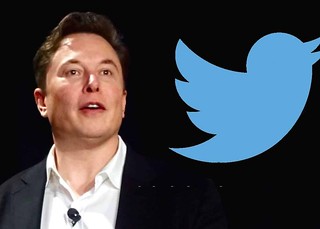Billionaire bows out: Elon Musk steps down as Twitter CEO

Elon Musk and Twitter, Photo courtesy of Flickr
May 24, 2023
Twitter has undergone a series of changes over the last few months since its acquisition by the Chief Executive Officer (CEO) of Tesla and SpaceX, Elon Musk in 2022 for $44 billion.
On May 11, Musk announced that he will be stepping down as CEO of Twitter, but will transition to being executive chair and Chief Technology Officer (CTO) overseeing production and software, according to NBC.
According to Senior Lecturer in the Communication Department Dr. Nicholas Temple, who specializes in public speaking rhetoric and digital contexts, there is a sort of duality to Twitter, as it has been a source of spreading both information and misinformation to the public. According to Temple, Twitter has had an undeniable cultural impact.
“I don’t use Twitter, but you can’t have existed in the culture without brushing up against Twitter tangentially,” Temple said. “Twitter has been great for spreading information and it’s been bad for spreading misinformation, that’s kind of the dual-edged sword that exists for a lot of communication media that exists out there right now. As much as I don’t use it and I sympathize with the idea that it’s like the cesspool of the internet in a lot of cases, you can’t deny that it had a lot of cultural impact.”
Twitter’s massive presence within the cultural landscape led to a huge reaction when Musk announced his takeover of the company in the fall of 2022, according to Mashable.
According to the BBC, Musk claimed that he wanted to purchase Twitter to help humanity and create a “digital town square” where he would promote freedom of speech for all. However, according to Temple, Musk has repeatedly gone against his supposed ideals of free speech after frequent bannings of his critics on the platform, such as CNN’s Donnie O’Sullivan and Mashable’s Matt Binder, according to PBS.
“Based on what I’ve heard, you have what Elon says he did [it] for,” Temple said. “Which was [Musk] advocating for free speech and he didn’t feel like Twitter, as it existed, was promoting free speech, [and] you have his actions after he did it which is to silence people who are his critics, which is not free speech.”
According to Assistant Professor of Communication Dr. Josh Nelson-Ichido, who specializes in interpersonal and intercultural communication, Twitter restructured global communication on a level that hadn’t been seen before. According to Nelson-Ichido, Musk’s takeover, while not eradicating that international connection, has diminished it.
“Since Musk has taken over, it hasn’t eradicated that [global community], it has diminished it,” Nelson-Ichido said. “In a lot of those areas where you have oppressed people, you have social movements that are still using Twitter as their lifeline [and] their method of communication, the fact that Musk is [messing] everything up is secondary to the fact that Twitter still very much matters to them.”
According to Nelson-Ichido, Musk’s acquisition of Twitter was, at least in part, motivated by ego rather than a genuine desire to improve the service.
“This is all speculation on my part, it’s influenced by things and ideas I’ve seen other people put out there,” Nelson-Ichido said. “This was all ego, I can’t not see that as at least a contributing factor. [Musk] has a persona that exists out there… he’s now an entity or character and this is something that [Musk] would do.”
In his six months as Twitter’s CEO, Musk has introduced a number of changes that caused controversy among users, including the reinstating of many previously banned controversial accounts (Kanye West, Donald Trump and Andrew Tate) and the removal of legacy checkmarks (meaning any previously verified account now has to pay for verification and has no way of proving they are truly that person/entity) according to the BBC. According to the Washington Post, paid verification (called Twitter Blue) has also stirred a response from users. According to Temple, these are all things that Musk has done that limit Twitter’s viability and credibility.
“By making [verification] a paid thing, it removes the ability to know you’re dealing with the real person [or] the real organization,” Temple said. “I teach public speaking, I teach rhetoric, so ethos is a big deal, online, part of that is being able to trust that somebody is who they say they are and if you can’t do that, what is even the purpose of this program?”
While the extent of the role these factors played into Musk’s departure can only be guessed at, what is certain is that Musk has found someone to fill his role as CEO: Linda Yaccarino. According to CNN, Yaccarino left her role as chairman of global advertising and partnerships at NBCUniversal.
According to Lecturer of Communication and Communication Recruiter Dr. Mary Eberhardinger, it was a smart move on Musk’s part to step down as CEO and place Yaccarino in that role.
“I think it’s really smart of [Musk] to put someone competent in the field of advertising in that position,” Eberhardinger said. “We know that Twitter was in a dire situation financially and we know it is advertising, it is attracting digital ads to the medium to make money.”

